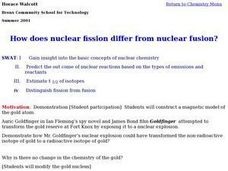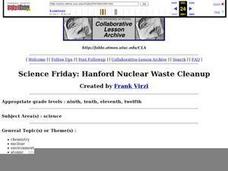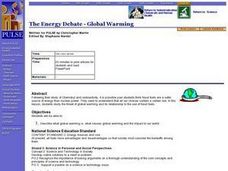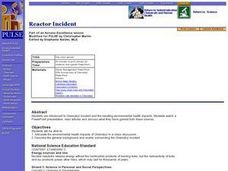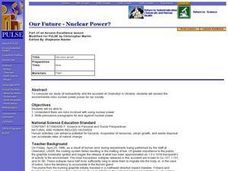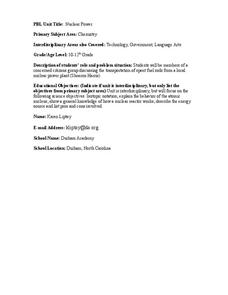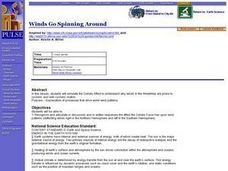Cornell University
Isotope Rummy
Thanks to this game, teaching isotopes will never be the same. Physical science scholars work their way toward understanding isotopes in an entertaining game. Pupils play rummy in groups while practicing good sportsmanship and creating...
Curated OER
How does Nuclear Fission differ from Nuclear Fusion?
Students examine concepts of nuclear chemistry. They compare and contrast the topics of nuclear fission and nuclear fision. They predict the outcome of reactions based on the types of emissions and reactants.
Curated OER
Chemical Calculations and Chemical Formulas
In this stoichiometry worksheet, students calculate molar masses, empirical and molecular formulas to solve 105 problems and short answer questions.
Curated OER
Chemical Formulas
Here is an interesting lesson which invites learners to focus on understanding and interpreting the symbols used in writing and communicating information about chemical elements, compounds, and equations. The hope is that this knowledge...
Curated OER
Answers for Elements and Compounds Crossword Puzzle
In this chemistry worksheet, students are provided with the answers to a 28 clue crossword puzzle about elements and compounds.
Curated OER
Science Friday: Hanford Nuclear Waste Cleanup
Students practice careful listening skills to learn about problems regarding cleanup of radioactive wastes at the Hanford nuclear reservation in Washington State. Students answer the questions imbedded in the lesson as they listen to the...
Virginia Department of Education
Elements and Electron Configuration
It's electronic! Pupils uncover elements and their electron configurations as they explore mass, groupings, correct charges, and sliding theory. Young scientists learn creative ways to remember various elements and correctly classify...
Curated OER
Elements And Compounds
For this elements and compounds worksheet, students solve 27 clues in a crossword based on the atomic structure of elements and bonding of compounds.
Curated OER
Group 14, The Carbon Group
Six slides summarize the details about group 14 in the periodic table, otherwise known as the carbon group. Young chemists will see facts about carbon itself, and then some general uses of related metalloids. This is a short and basic...
Curated OER
The Energy Debate - Global Warming
Learners describe what global warming is, what causes global warming and the impact to our world. They study the threat of global warming and its relationship to the use of fossil fuels.
Curated OER
Kinetics Practice 2-Key
In this kinetics worksheet, students solve seven problems related to chemical reactions and their rates. Students identify rate laws for mechanisms, they draw reaction diagrams, and they determine rate constants.
Curated OER
Reactor Incident
Students are introduced to Chernobyl incident and the resulting environmental health impacts they watch a PowerPoint presentation, read articles and discuss what they have gained from these sources.
Curated OER
Our Future - Nuclear Power?
Students comprehend that there are risks involved with using nuclear power. They write persuasive paragraphs for and against nuclear power. Students analyze the environmental issues and risks with nuclear power.
Curated OER
Experimental Rate Law
In this reaction rate worksheet, students determine the molecularity of a reaction plus show that the predicted rate law equals the experimental rate law. This worksheet has 3 problems to solve.
American Chemical Society
Joseph Priestley, Discoverer of Oxygen
Do you want to hear a joke about nitrogen and oxygen? NO. We all know there is oxygen in the air and that plants produce oxygen, but how was it discovered? Scholars read a handout, answer questions, and analyze material in the...
Curated OER
Radiation In Our World
Students identify the different sources of radiation around us. In this physics lesson plan, students calculate their estimated radiation exposure per year. They research a current issue about radiation.
Curated OER
The Energy Debate - Conclusion
Pupils write a persuasive essay about the choices in the energy debate. They comprehend the environmental consequences that accompany the decision. Students predict how they will power their future.
Curated OER
Finding the Ages of Rocks and Fossils
Young scholars practice dating fossils. They learn the concept of "deep time"--that earth was formed billions of years ago. They experience excellent hand-outs and virtual age tutorial links.
Curated OER
Exponential Decay
Students study exponential decay and its application to radiocarbon dating. In this exponential decay lesson, students use candy to model the time it takes for something to decay. Students also graph the data they collect and describe...
Curated OER
Growing Barley for Use in Biosynthesis Experiments
Students attempt to determine the optimum growing conditions for barley. They assess the effects of a number of substances such as ammonium chloride and urea on the plants
Curated OER
Nuclear Power
Students take on the role of members of a concerned citizens group and discuss the transportation of spent-fuel rods from a local nuclear power plant and the safety issues that surround the power plant. Students work in groups to write...
Curated OER
Unknown Element Project
Students work with a partner to determine the identity of an unknown element based on given descriptions. Groups use classroom textbooks, encyclopedias, and science internet sites to identify their unknown element then write a report as...
Curated OER
Marie Curie
In this famous person activity, students read a passage about Marie Curie and then complete a variety of in-class and homework activities to support comprehension, including partner interviews, spelling, cloze, synonym matches, and...
Curated OER
Winds Go Spinning Around
Students simulate the Coriolis Effect to comprehend why winds in the Westerlies are prone to cyclonic and anti-cyclonic motion. They arrive at an explanation of processes that drive world wind patterns



